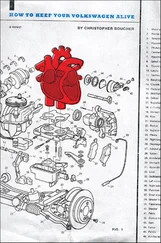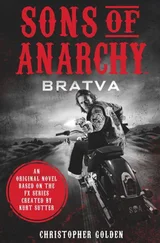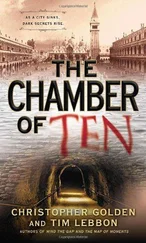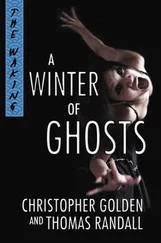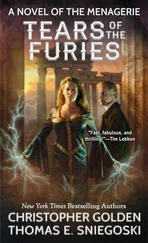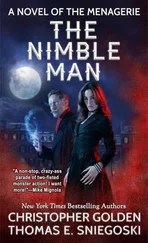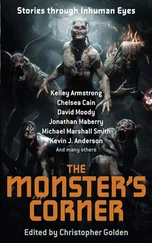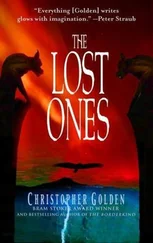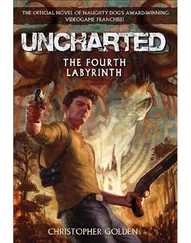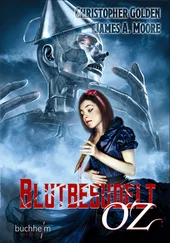“Love,” I said.
“Now it says,” she scanned the lawn, “ loathe . You loathe me?”
I was confused. “What the heck?” said a thought. “No,” I told her. “That’s supposed to say—”
“How dare you,” she said. “I’m your mother !”
Those were the years when my Mom worked long hours at the hospital. Sometimes, if my Dad was working, too, I’d have to go with her to work; she’d put me in an empty room in the hospital with some paper and paints and a snack. I wasn’t supposed to leave the room until she came to get me. But my legs would hurt from sitting, and so sometimes I would step out of the room and go for walks: down the halls, over to the elevators, to other floors. Most of the time I could get back to the room before my Mom returned, but every once in a while I’d get caught. Then my Mom would punish me by giving me double the snack — dumbcrackers and sadcola — and I wasn’t allowed to leave the room until I’d finished every bite.
Once, I was walking the hallways of the hospital when I saw my Mom in a room of doctors and nurses. All of their backs were turned to me, and something was screaming in the room — I didn’t know what or who. When my Mom turned around there was oil on her hands. “  !” she yelled. “What are you doing out here?”
!” she yelled. “What are you doing out here?”
Then I saw what was on the table: a motorcycle, its body bent and contorted. Everyone was shouting. The motorcycle screamed and then the screaming died.
“Vocal pressure’s dropping,” said one of the doctors.
My Mom turned to me. “Go,  ! I don’t want you to see this. Get back to the room right now.”
! I don’t want you to see this. Get back to the room right now.”
I went into the room with new thoughts. “Where did the screaming go?” one of my thoughts asked.
“I’m pretty sure it’s sleeping,” said another thought.
“It’s not sleeping ,” said another. “That screaming died, dumbass.”
“Died for how long?” asked the second thought.
“Forever,” said the first thought. “It’s dead.”
I turned to the hospital bed. “Have people died on you?” I asked it.
“What do you mean?” said the bed. “Of course they have.”
“A lot?” I said.
“Hundreds,” said the bed. “That’s my job, to be died on.”
A few days later, I was in my room in the hospital when I rolled up my sleeve, opened the tube of yellow paint, and poured it on my arm. Then I walked out to the nurse’s station. My Mom was smoking a six-foot cigarette and talking with another nurse.
“I’ve had an accident,” I announced.
My Mom looked up at me. “Go back in the room,  ,” she said.
,” she said.
I held out my arm. “I’m bleeding.”
“That’s paint ,” she said.
“I’m bleeding yellow,” I said.
“You better not have spilled any paint in that room,” she said. “Did you?” She rushed out from behind the desk, grabbed me by my yellow arm, and marched me back to the room. Then she studied the walls and the floor. “I better not see one drop of yellow paint in here.”
“People have died in this room!” I announced.
“Wash off your arm,” my Mom said. Then she slammed the door.
As I was rinsing my arm off in the sink, I noticed a supply cabinet underneath. When I opened the drawers I found cotton balls, wooden sticks, bandages, and a pair of scissors. I pulled out the scissors; they blinked their eyes in the light. “What year is it?” they asked me.
“Nineteen eighty-six,” I told them.
“ Eighty -six?” they said.
“Can you help me?” I said.
“Help you how?” the scissors said.
“I want you to cut me,” I told them.
The scissors studied my face. “Why?” they said.
“Just do it. Cut me,” I told them.
Two minutes later I walked out of the room again. This time there was blood on my wrist, dripping down my hand. “I’m injured,” I said. I held out my arm.
None of the nurses responded. My Mom was sitting with a patient — a heavy woman with gray toiled skin — and wrapping a blood-pressure cuff around her arm.
“I’m bleeding,” I said.
“Go back to the room,  ,” said my Mom.
,” said my Mom.
“I’m injured,” I said.
“Sal,” my Mom said to another nurse. “Can you check on him?”
“You do it,” I said to my Mom. “You check on me.”
“Sal?”
Another nurse came over to me, crouched down, and saw my wrist. “Jesus,  ,” she said. She called my Mom over. When she saw the blood, her face norsed and all of the color drained from it. “What did you do,
,” she said. She called my Mom over. When she saw the blood, her face norsed and all of the color drained from it. “What did you do,  ?” my Mom said. I remember how her hands shook as she wrapped the bandages around my arm and said, “How did this happen?”
?” my Mom said. I remember how her hands shook as she wrapped the bandages around my arm and said, “How did this happen?”
One night when I was eleven, though, one of my thoughts — a thought of green — thought over to the Hu Ke Lau (“Puke-E-Lau,” we called it) while I slept. At last call my thought hopped off his bar stool, pushed through the heavy doors, dropped his skateboard on the sidewalk and thought across the parking lot. He waved goodbye to some friendthoughts at the bike rack and then coasted past the snoring stores — the Big Why, Bagel Beagle — when car headlights suddenly grazed his shoulder. The thought of green turned around and studied the car: an old, brown Plymouth Duster with a number 8 behind the wheel. As my thought was watching, the number 8 changed into a B.
The thought darkened to a deeper shade of green. At home in my basement bedroom, I turned over in my sleep.
Shrugging off the worry, my thought turned around and pushed the skateboard toward home — down Grassy Gutter Boulevard and onto Apple Hill Road. When he looked back over his shoulder, though, he saw the round lights of the Duster still behind him. Was that car following him? He stopped his skateboard and stared into the windshield. He saw a flash in the B’s eye.
The thought custom-swore and sped up, skating down Apple Hill and then a quick left onto Coventry — a shortcut. When he looked back again, he didn’t see the Duster. He took a few deep breaths and slowed down, coasting down Coventry and back toward its intersection with Apple Hill. When he hit the corner, though, the thought saw the Duster’s lights again. The driver gunned the engine. The thought bore down, hauling toward the intersection with Converse, the car’s bumper inches from the skateboard’s tail. Emerald green. Military green. When he saw the backyard of my house through the trees, the thought jumped off the board and sprinted — through the grass, over the bushes, into the yard. The driver stopped the car, jumped out, stretched into a single line — a  —and slithered after the thought.
—and slithered after the thought.
The thought slid across the hatchway and dove through the open basement window. Then he turned and looked back at the figure on the lawn. Standing upright at the edge of the patio, the figure changed shape from an! to a? to an &. Then it grinned, straightened out, and dove into the ground.
The thought shut the window and thought across the room, back into my ear. I sniffed in my sleep — I was dreaming of green.
Читать дальше
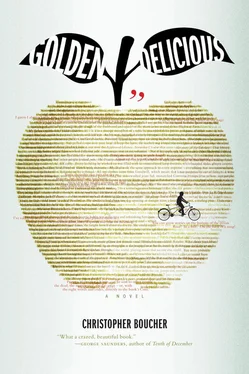
 !” she yelled. “What are you doing out here?”
!” she yelled. “What are you doing out here?” —and slithered after the thought.
—and slithered after the thought.
